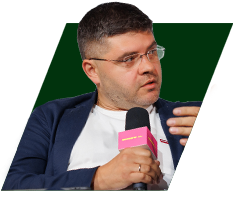Navigating disinformation and creating resilient information spaces at CYBERSEC FORUM/EXPO2023
With the rise of disinformation in recent years, various cross-sectorial initiatives were launched to tackle its spread. While these efforts have helped to ameliorate the situation, disinformation remains a problem. According to the Oxford Internet Institute’s media manipulation survey, the number of countries where political actors use social media to spread disinformation increased from 70 countries in 2019 to at least 81 countries in 2020. Moreover, advanced disinformation and malicious foreign operations are one of the top emerging cybersecurity challenges for the next decade, according to the latest ENISA report. Against this backdrop, the CYBERSEC Forum/Expo 2023 Conference will establish a space for the multiple stakeholders involved in the fight against disinformation to share learned lessons, discuss best practices, and engage in a dialogue to build a collective, holistic response.
To overcome the current disinformation landscape, it is critical to develop resilient information ecosystems capable of adapting to and resisting damage and recovering swiftly. Cooperation is a key element of this process. There are hundreds of different actors combatting disinformation across the globe. These include international organizations, governments, businesses, media, academia and civil society.
For instance, the European Union launched the Digital Services Act (DSA) and the Code of Practice on Disinformation to address the spread of disinformation on digital platforms. On the part of state actors, we find initiatives such as Sweden’s Psychological Defense Agency (PDA), which works to increase public resilience to propaganda and disinformation by providing training and support to citizens, organizations, and government agencies on how to recognize and counter psychological threats, such as disinformation. Initiatives like the Carnegie Endowment for International Peace’s Partnership for Countering Influence Operations, which aims to team up experts from academia, civil society, and the private sector to collaborate on countering influence operations and disinformation campaigns, are examples that represent the key role of civil society in the fight against disinformation.
The heterogeneous landscape of actors and initiatives makes cooperation challenging, but not impossible. Experts agree there is a need to create synergies between them to respond successfully to disinformation challenges. This can be achieved through establishing situational awareness, engaging in information sharing processes, and establishing collaborative actions among all actors involved.
The panel discussion ‘Navigating Disinformation Spaces: Strategies for building resilient information spaces’, which will take place on the 22nd of June, will revolve around the following questions: How can anti-disinformation efforts be effectively coordinated and enforced at the state level? What is the role of civilian and non-governmental actors in these processes? Which aspects of the problem can and should be addressed by the government, and which should not? Our panelists will explore the challenges and opportunities presented by disinformation, share valuable insights into the complex and evolving landscape of disinformation, and discuss strategies for building more resilient information spaces.
Article written by Gracia Sumariva Reyes.






























